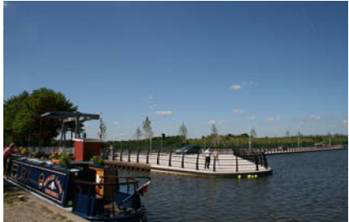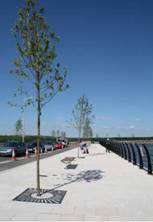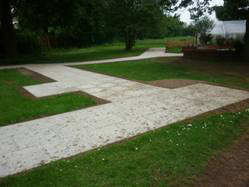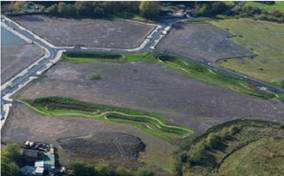Bickershaw SouthWinner of a CEEQUAL Outstanding Achievement Award 2013 for Flood Risk |
|
Whole Project Award
Project Team
Client: Homes
& Communities Agency
Designer: URS
& Amec
Construction: Birse
Civils
The Project
Bickershaw South Infrastructure was a key regeneration project in Leigh, near Wigan. The area was typified by high levels of local nuisance, trespass and vandalism, lack of amenities and low employment levels. The purpose of the project was to remediate the contaminated 18ha former colliery site and to provide primary infrastructure for future commercial and residential re-development, thus improving the economic prospects, environmental appeal and long-term sustainability of the local area.
The works broadly comprised:
- Excavation and re-compaction of colliery spoil (some 350,000m3 of earthworks)
- Bioremediation of contaminated land.
- New infrastructure to facilitate residential and commercial development on the former colliery site.
- A marina (connected to British Waterways’ Leeds-Liverpool Canal) to encourage commercial / leisure use.
- Provision of a sustainable urban drainage system (SUDS).
- Associated demolition, surfacing, highway drainage and street furniture.
It was decided from the outset that enrolment into the CEEQUAL scheme was a pre-requisite, that its framework would be used to deliver a truly sustainable, exemplar project and that the target was an award at ‘Excellent’ level.
Water Environment
Surface water was identified as a key issue as the site bordered Pennington Flash, a Site of Biological Interest (SBI), and directly impacted on the Site of Special Scientific Interest (SSSI) connecting to it. Instead of traditional underwater attenuation receptors, the team designed swales as part of a sustainable urban drainage system (SUDS).
This provided numerous benefits, including:
- Protection to the SBI (an essential wetland habitat for nesting birds) by controlling water flow into the Flash. These large ponds allow the water to drain through, with flow control mechanisms in place to release water at a measured rate.
- Increased habitat areas for water voles and great crested newts.
- Creation of an amenity feature throughout the site.
- Ease of long-term maintenance of the swales which were subsequently adopted by the local authority rather than a management group.
- A system able to manage 1:100 year flood conditions (plus 20% for climate change adaptation).
 |
 |
Community Involvement
For the local community, the regeneration of this unsightly area, formerly used for fly-tipping, brought numerous social benefits, including:
- Creating new areas of public open space for the enjoyment of residents and visitors.
- Constructing a new 40-berth marina, connected to the Leeds-Liverpool Canal
- Improving transport links in the area.
Incorporating the needs of the community into the project was a key consideration during the design stage. Designing suitable traffic management schemes was vital to minimising disruption during the works. The contractor’s traffic management proposals were assessed as part of the quality procurement process, ensuring the right contractor was selected for the works. Integrating the community into the works ensured they were kept fully informed and bought into the scheme. This was undertaken through:
- Drop in mornings held on site, with positive comments received from the community.
- Letter drops to local properties.
- Newsletters.
- Dedicated Public Liaison Officer.
- Information boards around the site perimeter.
As thank you for their patience, and to provide social benefit, a number of community initiative schemes were carried out by the team during construction. These included:
- Undertaking improvements at Broadmead Day Centre to make the gardens accessible to the service users, including constructing new walkways to connect the gardens, sensory areas and the polytunnel. These alterations have made the areas accessible to wheelchair users. We have also extended the car parking, making access easier for both staff and visitors.
- Organising a site visit for users and visitors of the Broadmead Day Centre.
- Remodelling the outdoor space at the Leigh Community Centre.
- Charity fundraising by members of the project team.
 |
 |
Providing employment opportunities within the local community, the project was meeting the requirements of the Wigan Borough Council Employment Charter even before it was formally put in place. The vast majority of staff working on the project live locally, with:
- 63% of staff living within 10 miles of the site.
- 99% of staff living within 20 miles of the site.


